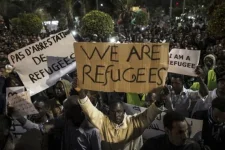Mass Deportations Raise Concerns for Gambians.
Western nations send many Gambians back home against their wishes. This highlights the need for The Gambia to strengthen its ties with other lands.
Germany leads these forced returns. The rise in such actions comes from deep changes in world trade and business. After the big wars, rich nations created banks and trade groups. These groups shaped how poor lands must act and pushed rules that hurt African nations.
The effects run deep. Poor nations lost their rights to make seeds and drugs. They had to sell their raw goods at low prices. Many skilled workers left home for jobs far away. Big companies harmed the earth with their work. Most damage fell on growing nations like The Gambia.
People in rich lands fear change. They want to keep their old ways, which leads them to push back against people who come from Africa. Yet these same rich lands played a big part in making African nations poor.
First came slavery. Then came rule by force. Today, trade rules keep Africa down. This leaves many with no choice but to seek better lives elsewhere. Yet rich nations say these people drain their wealth.
The Gambia can take clear steps. It must teach its values more. Schools should use local words, not just English. The land needs strong banks and courts.
Local groups like ECOWAS should help their members trade more. They should back goods made at home. The Gambia can lead talks about food, tools, and power needs in Africa.
Teamwork brings strength. The Gambia should join hands with nearby lands. This will help when talking to big powers like China, the EU, and the USA.
The Gambia must help its poorer people more. Half need aid to live, and those sent back need care for their minds and help finding work.
With time and work, The Gambia can grow strong. This will help its people live well at home and ensure that others treat them right when they go far away.
Western nations send many Gambians back home against their wishes. This highlights the need for The Gambia to strengthen its ties with other lands.
Germany leads these forced returns. The rise in such actions comes from deep changes in world trade and business. After the big wars, rich nations created banks and trade groups. These groups shaped how poor lands must act and pushed rules that hurt African nations.
The effects run deep. Poor nations lost their rights to make seeds and drugs. They had to sell their raw goods at low prices. Many skilled workers left home for jobs far away. Big companies harmed the earth with their work. Most damage fell on growing nations like The Gambia.
People in rich lands fear change. They want to keep their old ways, which leads them to push back against people who come from Africa. Yet these same rich lands played a big part in making African nations poor.
First came slavery. Then came rule by force. Today, trade rules keep Africa down. This leaves many with no choice but to seek better lives elsewhere. Yet rich nations say these people drain their wealth.
The Gambia can take clear steps. It must teach its values more. Schools should use local words, not just English. The land needs strong banks and courts.
Local groups like ECOWAS should help their members trade more. They should back goods made at home. The Gambia can lead talks about food, tools, and power needs in Africa.
Teamwork brings strength. The Gambia should join hands with nearby lands. This will help when talking to big powers like China, the EU, and the USA.
The Gambia must help its poorer people more. Half need aid to live, and those sent back need care for their minds and help finding work.
With time and work, The Gambia can grow strong. This will help its people live well at home and ensure that others treat them right when they go far away.












